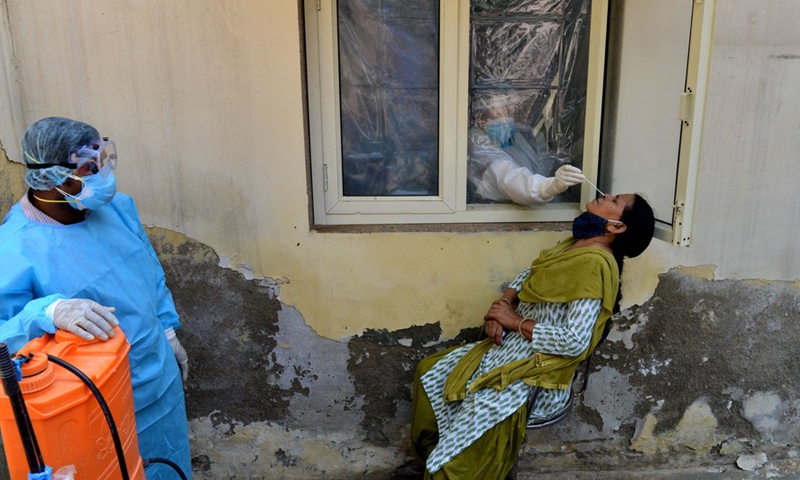Poor Indian women ‘learn to ignore’ sexual abuse at work
Source: Reuters Published: 2020/10/15 18:58:40
From lewd comments to demands for sex, women working in India's vast informal sector rarely report sexual harassment for fear of losing their jobs, labor rights campaigners said on Wednesday, three years after the #MeToo movement began.

The Ministry of Women and Child Development did not respond to repeated requests for comment. It launched an online complaint box for sexual harassment at work in 2017, which received about 600 complaints in its first two years.
Shalini, a maid who was sexually harassed by a security guard for months while working at a private residence on the outskirts of the capital New Delhi, said ordinary women were too scared to speak out.
"Some families blame the woman and start beating her. If you tell your employer, then they will fire you... Police are the worst. They ask really inappropriate questions," said Shalini, whose name has been changed to protect her identity.
"With no one to turn to, most women just bottle it all up inside. They learn to ignore or normalize it," she told Reuters, adding that in her case, the guard was transferred after her family complained to his employer.
The #MeToo campaign led to complaints of sexual misconduct by prominent journalists, film stars and executives across India but had little effect in remote, rural areas where sex crimes are rife, according to women's rights activists.
"The #MeToo movement helped to shine a light on violence and harassment at work, but the experiences of millions of women in India's informal sector remain invisible," said Meenakshi Ganguly, HRW South Asia director.
"India has progressive laws to protect women from sexual abuse by bosses, colleagues, and clients, but has failed to take basic steps to enforce these laws."
Reporting of sex crimes increased in India after the fatal gang rape of a student on a bus in 2012, with the introduction of tougher penalties, including a 2013 law to combat sexual harassment at work. Although the groundbreaking law mandates employers with at least 10 workers to set up women-led complaint committees with the power to fine or fire those found guilty of harassment, it remains largely an idea on paper. Only about 30 percent of 655 districts surveyed said they had formed committees, found a 2018 study.
"The implementation of the law has failed in the informal sector," said Anagha Sarpotdar, chairwoman of a complaints committee in Mumbai, India's most populous city.
Newspaper headline: Informal sector female ‘invisible’

A health worker takes a sample from a woman for COVID-19 screening at a hospital in New Delhi, India, October 11. Photo: Xinhua
From street vendors and factory workers to maids, 95 percent of Indian women work in the informal sector and many are exploited regularly, despite a law ordering employers to set up committees to resolve harassment complaints, Human Rights Watch (HRW) said.The Ministry of Women and Child Development did not respond to repeated requests for comment. It launched an online complaint box for sexual harassment at work in 2017, which received about 600 complaints in its first two years.
Shalini, a maid who was sexually harassed by a security guard for months while working at a private residence on the outskirts of the capital New Delhi, said ordinary women were too scared to speak out.
"Some families blame the woman and start beating her. If you tell your employer, then they will fire you... Police are the worst. They ask really inappropriate questions," said Shalini, whose name has been changed to protect her identity.
"With no one to turn to, most women just bottle it all up inside. They learn to ignore or normalize it," she told Reuters, adding that in her case, the guard was transferred after her family complained to his employer.
The #MeToo campaign led to complaints of sexual misconduct by prominent journalists, film stars and executives across India but had little effect in remote, rural areas where sex crimes are rife, according to women's rights activists.
"The #MeToo movement helped to shine a light on violence and harassment at work, but the experiences of millions of women in India's informal sector remain invisible," said Meenakshi Ganguly, HRW South Asia director.
"India has progressive laws to protect women from sexual abuse by bosses, colleagues, and clients, but has failed to take basic steps to enforce these laws."
Reporting of sex crimes increased in India after the fatal gang rape of a student on a bus in 2012, with the introduction of tougher penalties, including a 2013 law to combat sexual harassment at work. Although the groundbreaking law mandates employers with at least 10 workers to set up women-led complaint committees with the power to fine or fire those found guilty of harassment, it remains largely an idea on paper. Only about 30 percent of 655 districts surveyed said they had formed committees, found a 2018 study.
"The implementation of the law has failed in the informal sector," said Anagha Sarpotdar, chairwoman of a complaints committee in Mumbai, India's most populous city.
Newspaper headline: Informal sector female ‘invisible’
Posted in: ASIA-PACIFIC